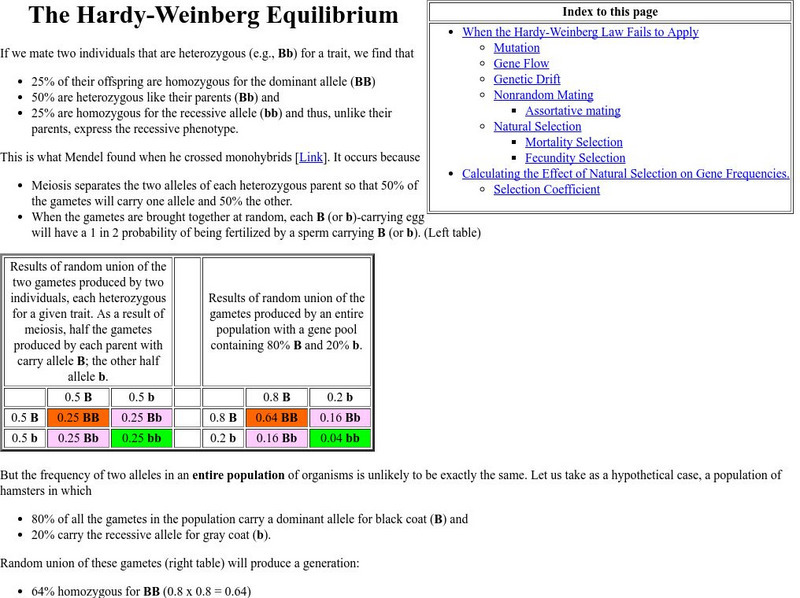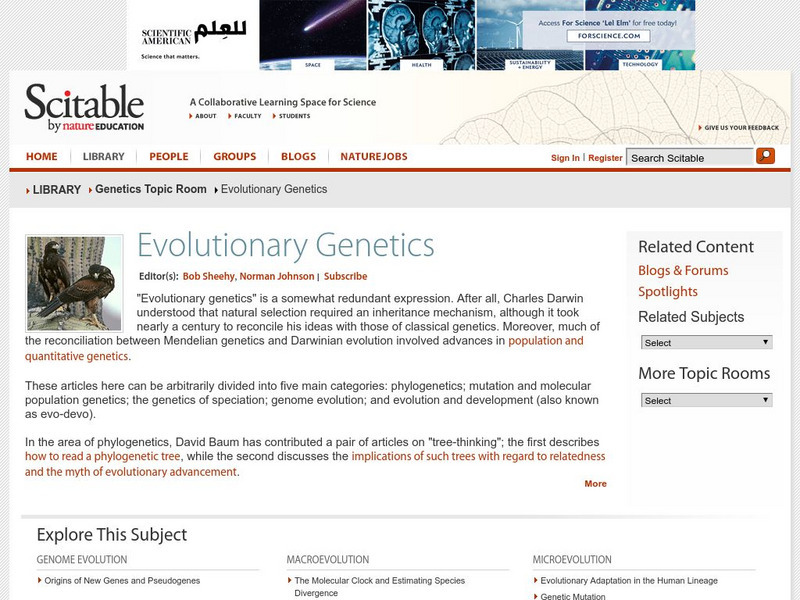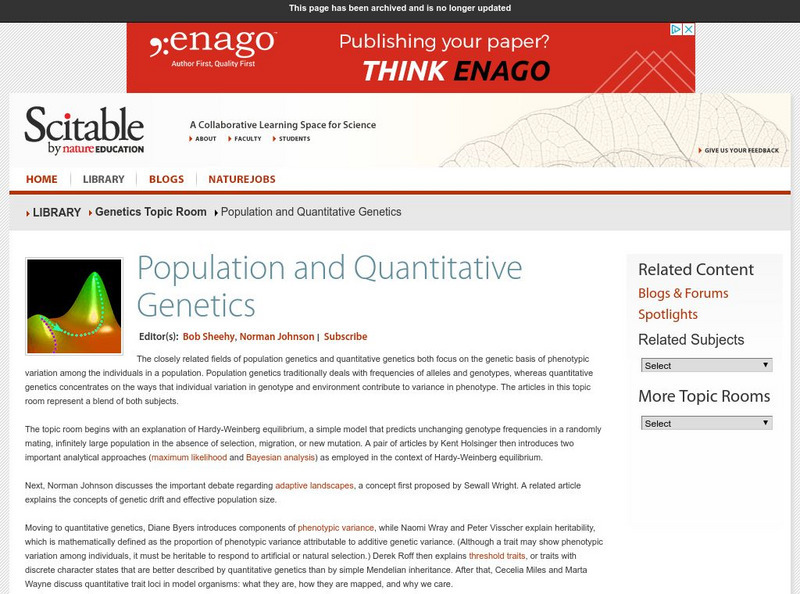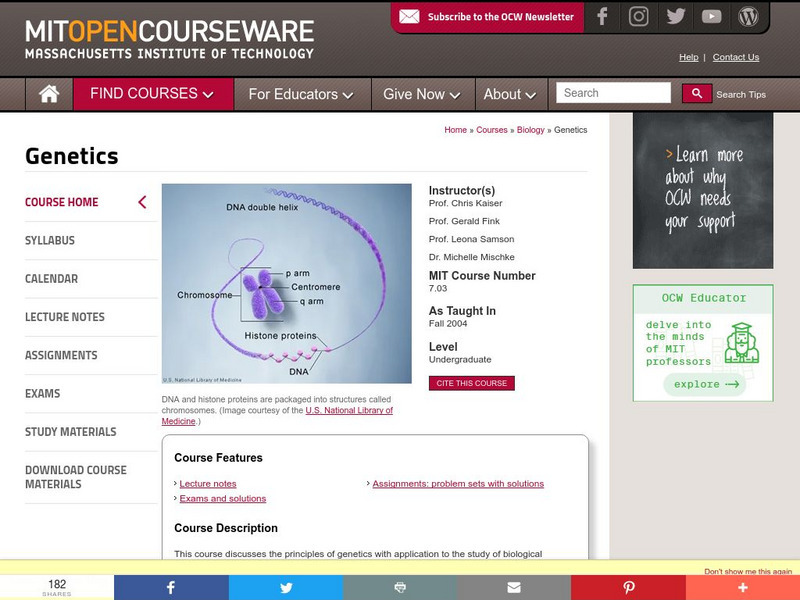Curated OER
AP: Chapter 23: The Evolution of Populations
How and why do populations change over time? AP biology aces explore this question by completing this assignment. They write the answers to 21 questions regarding population genetics, stability, genetic drift, polymorphism, and selection.
Curated OER
Bears of Banff
Students pretend they have just entered a national park. They imagine that the park borders are all impassable mountains, and students will play the role of grizzly bears. Students list three things every animal needs to survive, in this...
Curated OER
Mechanisms of Evolution
In this evolution worksheet, students will answer questions about population genetics and the theory of evolution of species. This worksheet has 15 true or false, 6 fill in the blank, and 4 short answer questions.
Curated OER
Modeling a Gene Pool
In this genetic worksheet, students examine how gene frequency changes in a population of organisms. After completing 5 pre-lab questions, they work in pairs to collect data and answer 5 additional post-lab questions.
Curated OER
Hardy-Weinberg Equilibrium According to Hoyle:
Students gain a feeling for the significance of the Hardy-Weinberg Equilibrium without using algebra but participating in an interactice game.
Biology Pages
Kimball's Biology Pages: Hardy Weinberg Equilibrium
Discusses conditions needed for the Hardy-Weinberg Law to hold true and demonstrates calculations involving allelic frequencies to illustrate this principle.
American Institute of Biological Sciences
Action Bioscience: Mitochondrial Dna Clarifies Human Evolution (2001)
DNA of the mitochondria has most commonly been used to construct evolutionary trees. New field of population genetics hopes to resolve important questions in migration theories that involve Aboriginies in Australia, North America, and...
Palomar Community College District
Palomar College: Hardy Weinberg Principle
This site from Palomar College describes the conditions needed for theHardy-Weinberg Principle to hold true.Completes sample calculations involvingthis principle.
University of Hamburg
University of Hamburg: The Hardy Weinberg Equilibrium
Discusses the historical background leadingto the development of the Hardy-Weinberg principleand the assumptions of the principle. Providesmathematical and graphical illustrations ofthis principle.
Other
Woodrow Wilson Leadership Program in Biology: Populations to Molecules
A large collection of lesson and labs developed by high school biology teachers. Lesson plans cover the topics of Drosophila, population genetics, gene, molecular genetics, chromosomes, genetic disease, genetic counseling, and bioethics....
Nature Research
Scitable: Evolutionary Genetics
A collection of articles on evolutionary genetics focusing on the topics of phylogenetics, mutation and molecular population genetics, the genetics of speciation, genome evolution, and evolution and development. Learn how to read a...
Nature Research
Scitable: Population and Quantitative Genetics
Do you know the difference between population genetics and quantitative genetics? This webpage examines both population genetics which concentrates on frequencies of alleles and genotypes and quantitative genetics which deals with the...
Massachusetts Institute of Technology
Mit: Open Course Ware: Courses: Biology: Genetics
College-level course focusing on the principles of genetics. Course topics include structure and function of genes, chromosomes and genomes, biological variation, population genetics, use of genetic methods to analyze protein function,...
Estrella Mountain Community College
Online Biology Book: The Modern View of Evolution
Take a closer look into the modern view of evolution. This article includes many pieces of evidence, all which support the theory of evolution.
Palomar Community College District
Palomar College: Gene Flow
This site from Palomar college explains what gene flow is and describes a situation where this occurs in humans. Information is brief but factual.
Cold Spring Harbor Laboratory
Dolan Dna Learning Center: Learn About Genetics: Genetic Screening
Learn how genetic screening is used to identify people who are healthy genetic carriers for diseases that occur more often in certain populations.
BioMan Biology
Bio Man Biology: Angry Aliens: Evolution
Teach aliens about evolution as you play this game, and review your own understanding in the process. Topics covered include evolutionary mechanisms, evidence of evolution, natural selection, reproductive isolation, population genetics,...
Other
Univ. Of Connecticut: Hardy Weinberg Principle and Estimating Allele Frequencies
This site from the University of Connecticut is Kent Holsinger's site on The Hardy-Weinberg Principle. A great site to check out on the subject, with links to additional information, including: derivation of the Hardy-Weinberg Principle,...
Other
University of Connecticut: Genetic Drift
A Java simulation of genetic drift where users can select a starting allele frequency, population size, and a maximum number of generations. Simulation gives a graph that shows allele frequency versus generation number.
Other
Evolution: The Theory of Natural Selection (Part 1)
These pages are part of a site called Evolution that accompany a textbook by the same name. Mark Ridley is the author. This section has an advanced discussion of determining allele and genotype frequencies using the Hardy-Weinberg ratio.
Other
University of Illinois: Population Genetics [Pdf]
This site from the University of Illinois at Chicago provides an in-depth article on Human Genetics, with a focus on primarily population genetics. The article is factual and informative full of charts, formulas, and extensive text. A...
National Health Museum
Nhm: Amino Acid Sequences Show Evolution
This lesson plan focuses on differences in the amino acid sequence of hemoglobin and myoglobin proteins. They use the number of differences to create a phylogenetic tree.
National Health Museum
Access Excellence: Molecular Biology/primate Phylogeny
This lesson plan involves comparison of amino acids to create a phylogenetic tree of primates. Learners will also use other species information to draw conclusions about evolutionary relationships.
National Health Museum
Access Excellence: Hardy Weinberg Equilibrium
This site explores what Hardy-Weinberg Equilibrium is, and how teachers can explore this topic in their classrooms. Content includes background information on this topic, as well as numerous learning activities.

















